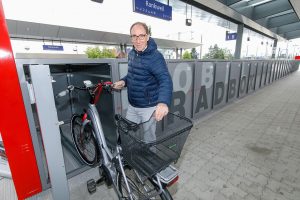New framework agreement for bicycle boxes at train stations enables aquisition

How does the train station in your municipality get modern bike boxes with a locking system and booking portal? Through a framework agreement of the Verkehrsverbund Tirol, which is based on the experience of Radkompetenz member Land Vorarlberg. This offer is available in Vorarlberg, Tyrol, Salzburg, Upper and Lower Austria together with ÖBB. In a guest article from Tyrol, we explain the development and applicability of the framework agreement.
Bike boxes as the key to switching to public transport
Transport associations organize and order public transport, especially buses and trains. However, the tasks have changed more and more in recent years. Transport associations are increasingly becoming mobility associations that also offer supplementary products to make it easier for passengers to use public transport. E-bikes make it easier to get to transport hubs, especially in mountainous federal states such as Tyrol. They can also be used to cover ever greater distances, making them a serious alternative to the car. However, users do not want to simply park expensive e-bikes in open and perhaps still overcrowded bicycle parking spaces during the day. The state of Vorarlberg therefore began installing bike boxes at train stations in 2021 and has been working on rolling out the facilities on a large scale ever since.
In September 2020, the first VMOBIL bike boxes were opened at Rankweil train station by the then Provincial Councillor Johannes Rauch, read more in this article.
Cooperation leads to Austria-wide roll-out
In order to benefit from Vorarlberg’s experience, the Tyrolean Transport Association sought cooperation with the Vorarlberg Transport Association. This has resulted in a joint tender for bicycle boxes, which also takes into account the initial experience gained from calls and applications in the state of Vorarlberg. ÖBB-Infrastruktur AG is an important partner for the transport associations as the bike boxes are primarily to be installed at train stations. ÖBB-Infrastruktur specifies important properties for the steel construction of bike boxes so that they meet the requirements for railroad stations. Further, they provide the space for the bike boxes at the stations. In principle, however, bike boxes can also be set up at other mobility hubs away from train stations.
As ÖBB-Infrastruktur is active throughout Austria, there was soon a desire to set up the tender for the bike boxes as broadly as possible in Austria. In the end, the federal states and transport associations of Vorarlberg, Tyrol, Salzburg, Upper and Lower Austria, as well as ÖBB-Infrastruktur and ÖBB-Immobilienmanagement itself, are now entitled to call up booking portals, bike boxes and locking systems via the framework agreement of the Tyrol Transport Association. By pooling the order and the resulting minimum quantities, attractive prices could be achieved in the tender.
The path from the framework agreement to the installation of the bike boxes on site
The bike boxes were awarded in a two-stage process. The best bidder was Kienzler Stadtmobiliar GmbH, based in Hausach in southern Germany. The framework agreement concluded in May 2023 covers the booking portal including the associated app, the steel construction of the bike boxes including the locking system and the software and hardware maintenance. After a call-off, the booking portal is first implemented for the customer. If an APP is called up, it is set up in the same way as the booking portal. The booking portal is individualized according to the retrieving federal state, especially in the CI area, but prices and terms of use are also adjusted.
The first bike boxes can be called up and set up at the same time or after the booking portal has been called up. An operating terminal is provided for each bike box unit, which the customer can use to open the boxes. The booking data is continuously transferred from the booking portal to the box system via a SIM card. The boxes can be opened using an RFID card, QR code or numeric PIN code.
The boxes can be set up as double boxes to save space, the minimum size is 6 boxes. The bikes are stabilized in the lower box by a central rail. Helmets and other equipment can be stored on a hook or a storage tray on the inside wall. Charging sockets can be installed in the lower level at the customer’s request. Bicycles can be conveniently lifted to the upper level via a rail supported by a gas pressure spring.
To monitor the operation and utilization of the bike boxes, Kienzler provides a statistics tool. Here you can call up and track all bookings, but also carry out various evaluations of the occupancy of the boxes and the revenue. This gives operators the opportunity to react to bottlenecks in bookings or to plan targeted marketing campaigns.
Austria-wide roll-out still needs operators
A nationwide operator must be named for each federal state. This operator handles the call-offs via the framework agreement and is responsible for the maintenance and operation of the bike boxes. For the federal states of Vorarlberg and Tyrol, the respective transport associations have carried out the calls for the booking portals and are the contact partners for the municipalities that want to set up bike boxes on their municipal territory and, of course, for ÖBB. In Lower Austria, Radkompetenz member Radland is planning to launch the booking portal in the near future. A launch is also being prepared in Salzburg.
If you have any detailed questions, please email the author of the article: Alexandra Medwedeff, Verkehrsverbund Tirol
Cycling Competence Members in this article:
More articles with this member:
[crp]
Share this article:
New framework agreement for bicycle boxes at train stations enables aquisition
Share this article:

How does the train station in your municipality get modern bike boxes with a locking system and booking portal? Through a framework agreement of the Verkehrsverbund Tirol, which is based on the experience of Radkompetenz member Land Vorarlberg. This offer is available in Vorarlberg, Tyrol, Salzburg, Upper and Lower Austria together with ÖBB. In a guest article from Tyrol, we explain the development and applicability of the framework agreement.
Bike boxes as the key to switching to public transport
Transport associations organize and order public transport, especially buses and trains. However, the tasks have changed more and more in recent years. Transport associations are increasingly becoming mobility associations that also offer supplementary products to make it easier for passengers to use public transport. E-bikes make it easier to get to transport hubs, especially in mountainous federal states such as Tyrol. They can also be used to cover ever greater distances, making them a serious alternative to the car. However, users do not want to simply park expensive e-bikes in open and perhaps still overcrowded bicycle parking spaces during the day. The state of Vorarlberg therefore began installing bike boxes at train stations in 2021 and has been working on rolling out the facilities on a large scale ever since.
In September 2020, the first VMOBIL bike boxes were opened at Rankweil train station by the then Provincial Councillor Johannes Rauch, read more in this article.
Cooperation leads to Austria-wide roll-out
In order to benefit from Vorarlberg’s experience, the Tyrolean Transport Association sought cooperation with the Vorarlberg Transport Association. This has resulted in a joint tender for bicycle boxes, which also takes into account the initial experience gained from calls and applications in the state of Vorarlberg. ÖBB-Infrastruktur AG is an important partner for the transport associations as the bike boxes are primarily to be installed at train stations. ÖBB-Infrastruktur specifies important properties for the steel construction of bike boxes so that they meet the requirements for railroad stations. Further, they provide the space for the bike boxes at the stations. In principle, however, bike boxes can also be set up at other mobility hubs away from train stations.
As ÖBB-Infrastruktur is active throughout Austria, there was soon a desire to set up the tender for the bike boxes as broadly as possible in Austria. In the end, the federal states and transport associations of Vorarlberg, Tyrol, Salzburg, Upper and Lower Austria, as well as ÖBB-Infrastruktur and ÖBB-Immobilienmanagement itself, are now entitled to call up booking portals, bike boxes and locking systems via the framework agreement of the Tyrol Transport Association. By pooling the order and the resulting minimum quantities, attractive prices could be achieved in the tender.
The path from the framework agreement to the installation of the bike boxes on site
The bike boxes were awarded in a two-stage process. The best bidder was Kienzler Stadtmobiliar GmbH, based in Hausach in southern Germany. The framework agreement concluded in May 2023 covers the booking portal including the associated app, the steel construction of the bike boxes including the locking system and the software and hardware maintenance. After a call-off, the booking portal is first implemented for the customer. If an APP is called up, it is set up in the same way as the booking portal. The booking portal is individualized according to the retrieving federal state, especially in the CI area, but prices and terms of use are also adjusted.
The first bike boxes can be called up and set up at the same time or after the booking portal has been called up. An operating terminal is provided for each bike box unit, which the customer can use to open the boxes. The booking data is continuously transferred from the booking portal to the box system via a SIM card. The boxes can be opened using an RFID card, QR code or numeric PIN code.
The boxes can be set up as double boxes to save space, the minimum size is 6 boxes. The bikes are stabilized in the lower box by a central rail. Helmets and other equipment can be stored on a hook or a storage tray on the inside wall. Charging sockets can be installed in the lower level at the customer’s request. Bicycles can be conveniently lifted to the upper level via a rail supported by a gas pressure spring.
To monitor the operation and utilization of the bike boxes, Kienzler provides a statistics tool. Here you can call up and track all bookings, but also carry out various evaluations of the occupancy of the boxes and the revenue. This gives operators the opportunity to react to bottlenecks in bookings or to plan targeted marketing campaigns.
Austria-wide roll-out still needs operators
A nationwide operator must be named for each federal state. This operator handles the call-offs via the framework agreement and is responsible for the maintenance and operation of the bike boxes. For the federal states of Vorarlberg and Tyrol, the respective transport associations have carried out the calls for the booking portals and are the contact partners for the municipalities that want to set up bike boxes on their municipal territory and, of course, for ÖBB. In Lower Austria, Radkompetenz member Radland is planning to launch the booking portal in the near future. A launch is also being prepared in Salzburg.
If you have any detailed questions, please email the author of the article: Alexandra Medwedeff, Verkehrsverbund Tirol
Cycling Competence Members in this article:
More articles with this member:
[crp]


